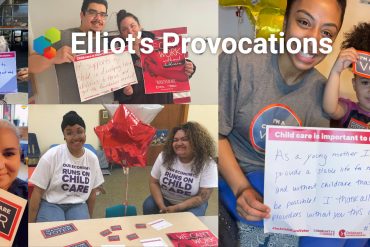Welcome to the first edition of my new monthly column, “Elliot’s Provocations.” The goal of this column is to unpack...
Oldest
Elliot’s Provocations
Elliot’s Provocations unpacks current events in the early learning world and explores how we can chart a path to a future where all children can flourish. Regarding the title, if you’re not steeped in early childhood education (ECE) lingo, a “provocation” is the field’s term—taken from the Reggio-Emilia philosophy of early education—for offering someone the opportunity to engage with an idea.
We hope this monthly column does that: provocations are certainly not answers, but we hope Elliot’s Provocations helps you pause and consider concepts in a different way.














